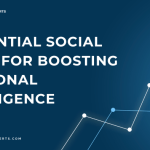Table of Contents
- Introduction
- 1. Enhanced Communication Skills
- 2. Improved Team Collaboration
- 3. Greater Conflict Resolution Abilities
- 4. Increased Employee Engagement
- 5. Better Decision-Making
- 6. Stronger Adaptability
- 7. Fostering a Positive Workplace Culture
- Conclusion
- FAQs
Introduction
In today’s fast-paced business environment, technical skills are just one piece of the puzzle. Emotional intelligence (EI) has become a vital component of effective leadership. Leaders with high emotional intelligence understand their emotions and those of others, enabling them to foster a more productive and harmonious workplace. As businesses navigate challenges in 2024 and beyond, the importance of EI in leadership continues to grow. Let’s explore seven transformative ways emotional intelligence can lead to leadership success.
1. Enhanced Communication Skills
Effective communication is the cornerstone of successful leadership, and emotional intelligence plays a pivotal role in this area. Leaders who possess high EI can express their thoughts clearly and empathetically, ensuring that their message resonates with their team.
Key Points:
- Active Listening: Leaders with high EI practice active listening, fully concentrating on what is being said rather than just passively hearing the message. This fosters trust and respect.
- Nonverbal Communication: EI-aware leaders are adept at interpreting body language and tone, allowing them to respond appropriately to the emotional context of conversations.
Example: A leader notices that a team member seems withdrawn during meetings. Instead of pushing forward, they take the time to check in privately, demonstrating understanding and care.
Visual Element: Table of Communication Styles
| Communication Style | Description | EI Impact |
|---|---|---|
| Assertive | Direct and respectful | Builds trust and clarity |
| Passive | Avoids conflict | Leads to misunderstandings |
| Aggressive | Dominates conversations | Creates tension and resentment |
For further reading on effective communication strategies, check out 10 Positive Thinking Techniques to Reduce Stress.
2. Improved Team Collaboration
Emotional intelligence fosters an environment where collaboration thrives. Leaders who understand the dynamics of their team can create spaces for open dialogue and shared goals.
Key Points:
- Empathy: Leaders with high EI can empathize with team members, understanding their perspectives and emotions, which leads to better collaboration.
- Building Trust: EI allows leaders to create an atmosphere of trust, essential for team members to feel safe sharing ideas and taking risks.
Example: A leader encourages team brainstorming sessions, where all ideas are valued, leading to innovative solutions and a sense of belonging.
3. Greater Conflict Resolution Abilities
Conflicts are inevitable in any workplace, but emotionally intelligent leaders have the skills to manage and resolve them effectively.
Key Points:
- Identifying Triggers: EI leaders can recognize emotional triggers in themselves and others, allowing them to approach conflicts with a calm and constructive mindset.
- Mediation Skills: High EI leaders serve as mediators, facilitating discussions that lead to mutual understanding and resolution.
Example: When a conflict arises between departments, an emotionally intelligent leader organizes a meeting to hear both sides, guiding the conversation toward a compromise.
For insights on stress management that can complement conflict resolution skills, visit 10 Proven Stress Management Techniques for Daily Relief.
4. Increased Employee Engagement
Engaged employees are more productive, and emotional intelligence is a key factor in fostering this engagement.
Key Points:
- Recognition and Appreciation: Leaders with high EI understand the importance of recognizing individual contributions, boosting morale and engagement.
- Aligning Values: EI leaders connect employees’ personal values with organizational goals, creating a sense of purpose.
Example: A leader regularly acknowledges individual successes during team meetings, making employees feel valued and motivated.
For more insights on enhancing employee engagement, check out 10 Ways Positive Thinking Boosts Workplace Success.
5. Better Decision-Making
Emotional intelligence enhances decision-making capabilities by allowing leaders to consider emotional impacts alongside logical reasoning.
Key Points:
- Balanced Approach: EI leaders weigh emotional and rational factors, leading to well-rounded decisions that consider the welfare of the team.
- Informed Choices: By understanding the emotional climate of their team, EI leaders can make decisions that are more likely to be accepted and supported.
Example: When making budget cuts, an emotionally intelligent leader considers the impact on employee morale and seeks the least disruptive course of action.
6. Stronger Adaptability
In a world of constant change, adaptable leaders are crucial. Emotional intelligence equips leaders with the ability to navigate uncertainty and guide their teams through transitions.
Key Points:
- Flexibility: EI leaders are open to feedback and can pivot strategies when necessary, demonstrating resilience in the face of challenges.
- Supportive Guidance: They provide emotional support to team members during changes, helping to ease anxiety and resistance.
Example: During a company restructure, an emotionally intelligent leader holds regular check-ins to address concerns and provide clarity.
For strategies on managing stress during transitions, see 10 Effective Stress Reduction Techniques for Students.
7. Fostering a Positive Workplace Culture
A positive workplace culture is essential for employee satisfaction and retention. Leaders with high emotional intelligence are instrumental in creating and maintaining this culture.
Key Points:
- Encouraging Positivity: EI leaders promote positivity through their actions and attitudes, inspiring their teams to adopt a similar mindset.
- Open Communication: They encourage transparent communication, where employees feel safe sharing their thoughts without fear of judgment.
Example: A leader implements regular team-building activities that not only enhance relationships but also contribute to a supportive workplace environment.
For more on building a positive workplace culture, explore 10 Ways Positive Thinking Transforms Your Relationships.
Conclusion
Emotional intelligence is not just a buzzword; it’s a vital skill that can profoundly impact leadership success. From enhancing communication to fostering a positive workplace culture, the benefits of high emotional intelligence are clear. As we move further into 2024 and 2025, organizations that prioritize emotional intelligence in their leaders will likely see improved team dynamics and overall success.
By investing in emotional intelligence development, leaders can cultivate an environment where both individuals and organizations thrive.
FAQs
Q: What is emotional intelligence?
A: Emotional intelligence is the ability to recognize, understand, and manage our own emotions, as well as the emotions of others.
Q: Can emotional intelligence be developed?
A: Yes, emotional intelligence can be developed through training and practice, such as mindfulness techniques and empathy exercises.
Q: How does emotional intelligence affect team performance?
A: High emotional intelligence in leaders leads to better communication, conflict resolution, and team collaboration, all of which positively impact team performance.
By embracing emotional intelligence, leaders can not only achieve personal success but also inspire and elevate those around them. Let’s strive to be leaders who make a difference!




